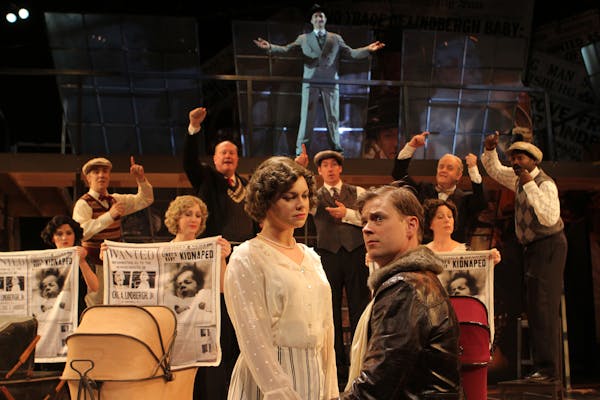If you think Twitter and the 24-hour news cycle created the phenomenon of the media feeding frenzy, then "Baby Case" may be a teachable moment. Michael Ogborn's musical, which opens History Theatre's season, takes direct aim at the circus that was unleashed in 1932 by the kidnapping of celebrity pilot Charles Lindbergh's infant son.
It's the "crime of the century" seen through the eyes of a cynical press and an insatiable public.
Lindbergh, who spent his boyhood in Little Falls, Minn., became an instant American hero when he successfully completed the first transatlantic flight in 1927. His subsequent marriage and the birth of his first child only whetted the public's appetite for more, so it's not surprising that the sensational nature of the kidnapping of Charles Jr. was just the fuel needed to kick off a perfect firestorm of news coverage. Reporters trampled the crime scene in search of leads. William Randolph Hearst paid for the defense of alleged kidnapper Bruno Hauptmann in return for exclusive interviews. After the child's body was discovered, gruesome autopsy photos were published.
Radio personality Walter Winchell, played with oily panache by Jon Andrew Hegge, functions as narrator and emcee of this sinister circus, as 10 actors portray the rest of the characters, including a panoply of such famous figures as Al Capone, Father Charles Coughlin and Ginger Rogers. The action unfolds on Michael Hoover's ingenious two-level set, which features gigantic newspaper headlines and the faces of frantic reporters plastered across the walls and the floor.
Under Ron Peluso's direction, this production is infused with high energy, uniformly solid performances and lovely voices, led by Peter Middlecamp, in the dual roles of Lindbergh and Hauptmann, and Kendall Anne Thompson as Anne Morrow Lindbergh and Anna Hauptmann. These two in particular lend some much needed heart to the piece as they evoke the sorrows and helplessness of both couples.
A strong production, however, can't overcome some of the inherent flaws in Ogborn's work. Specifically, while his concept of viewing this tragedy through the lens of its publicity is a clever one, he clearly doesn't know when to stop. There are 27 musical numbers in "Baby Case" and many of them serve merely to hammer at points long after they've been made. Others, such as "Lawsuit Daddy" and "Trial Drinking Song", have such a tenuous relationship to the plot that they seem self-indulgent.
The same could be said for a short scene showing Lindbergh receiving the Iron Cross from Hitler's government, which is dropped in at the end completely without context or discernible purpose.
While "Baby Case" has its moments, it teeters on the edge of becoming as shrill and over-the-top as the situation it depicts.
Lisa Brock writes regularly about theater.

Minnesota Sports Hall of Fame: A class-by-class list of all members

This retired journalist changed professional wrestling from Mankato

